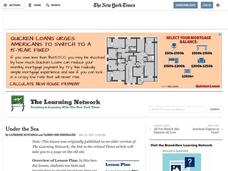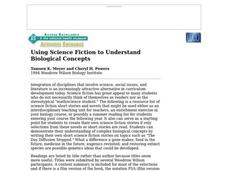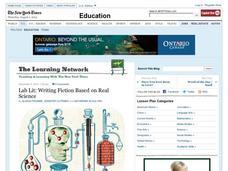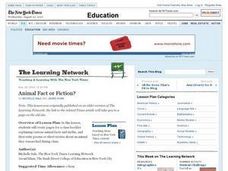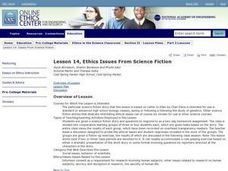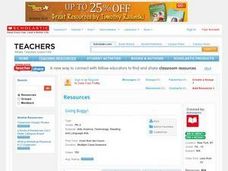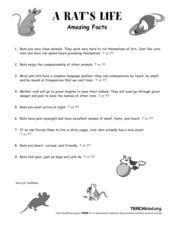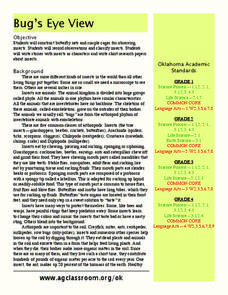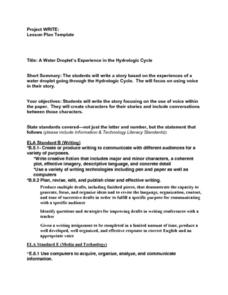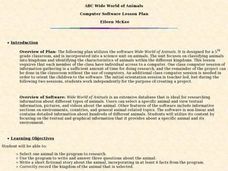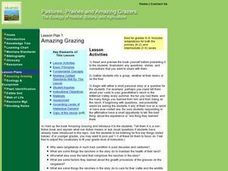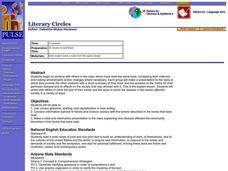Curated OER
Under the Sea
Students imagine and describe fictitious sea animals that might live in the ocean. After reading an article, they reflect on new discoveries found in the ocean recently. Using the internet, they research the interdependence of animals...
Curated OER
E.T., Are You Out There?
Research the necessary components of a planet that supports life after reading the article "All of a Sudden, The Neighborhood Looks a Lot Friendlier" from The New York Times. After finding their information, middle and high schoolers...
Curated OER
Using Science Fiction To Understand Biological Concepts
Students read and discuss," The Andromeda Strain" by Michael Crichton and complete a short writing exercise as a warm-up for a longer piece of science fiction writing. They choose a topic and create a science fiction short story such...
The New York Times
Writing Fiction Based on Real Science - NYTimes.com
Refuse to alienate your scientific-minded young scholars during your creative writing unit. Learners explore how literary writing can reflect observable fact, and be based in actual science. The links include examples of fiction and...
Curated OER
Animal Fact or Fiction?
Read and discuss the article "Welcome to Cicadaville (Enter at Your Own Risk)" to gain a better understanding around the confusion regarding cicadas and locust swarms. In groups your young analysts research statements about animals to...
Curated OER
A "How To" Project in the Science Fiction Genre
You can have students use science fiction elements to create a "How To" brochure that can stir the imagination.
Curated OER
Ethics Issues From Science Fiction
Students analyze ethics issues as they read science fiction works. For this science and ethics lesson, students read science fiction short stories of their choosing, investigate the ethics issues raised in the stories, and...
Curated OER
Going Buggy
Students identify the parts of a dragonfly that they drew. They write a very short non-fiction story (mainly with pictures) about the adventure of a dragonfly. They interview a person dressed as a dragonfly to find out some things about...
PBS
Stories of Painkiller Addiction: Commitment to Recovery
Recovery from substance addiction is an ongoing process. The final lesson in a series about painkiller abuse and addiction prompts learners to research various recovery options before writing a short story about a character who is going...
Curated OER
A Rat's Life
Here is a two-page worksheet on rats and mice. Learners answer nine true/false questions about rats and mice, then compose answers to seven short-answer questions about these two rodents. Finally, they must compose a fictional story...
Alabama Wildlife Federation
Wildlife Habitat Checklist
Take a walk on the wild side with a project about animal habitats. After kids observe a chosen animal in its home, they describe the animal's food and water sources, shelter, and how it raises its young. They then write a short fictional...
Curated OER
Science Center Ideas for Students Who Finish Work Early
A science center can be a great way to extend the learning of students who finish their work early.
Virginia Department of Education
Physical and Chemical Properties of Water
How can you effectively provide detailed concepts of water properties to your high school class in a way they find exciting and challenging at the same time? By letting them play, of course! Through a variety of...
Curated OER
Introduction to Mendelian Genetics using Fiction
Students investigate Mendelian Genetics by studying the history of Mendel and what it was like to be a 19th century scientist. They read a pieces of fiction during this investigation.
Curated OER
Reindeer Research
Students research reindeer habitats and purposes. They investigate the historical significance of reindeer and the Christmas holiday. Finally, they write a short fictional story about reindeer using the information from their research.
Curated OER
Bug's Eye View
Students explore biology by writing fictitious stories in class. In this insect life lesson, students identify many different types of insects in the animal kingdom and the classifications they fall into. Students collect insects on a...
Curated OER
Human Evolution
Students recognize that achievements of human beings throughout human history can be considered part of the ongoing story of human evolution. They research settings such as the biosphere and Mars and write imaginative short stories using...
Curated OER
Traveling Through Literature
Integrate geography with literature in this interdisciplinary instructional activity. Begin by reading a poem such as The Time We Climbed Snake Mountain by Leslie Marmon Silko. On a large map, place push pins in the cities or states...
Curated OER
Coral Reefs
Learners examine the animals that live in a coral reef and how they adapt to their environment. In this coral lesson students write a short book on how animals inhabit the coral reefs.
Curated OER
And Tomorrow's Forecast Is...
Students create original short stories that feature distinctive weather phenomena, such as rainbows, snowstorms, tornadoes, thunder and/or lightning. They use a story map, imbedded in this plane, to help them organize their story.
Curated OER
A Water Droplet's Experience in the Hydrologic Cycle
Students write a story from the perspective of a water droplet on a journey through the water cycle. They use the 6+1 Traits writing method to focus on voice in the writing as they create characters that their water droplet has...
Curated OER
ABC Wide World of Animals
Fifth graders use the software Wide World of Animals. This instructional activity is incorporated into a science unit on animals. The unit focuses on classifying animals into kingdoms and identifying the characteristics of animals within...
Curated OER
Amazing Grazing
Students discuss their experiences on a ranch. As a class, they tell the best part of their experiences or one thing they gathered from being on the ranch. They listen to the story and identify five items to focus on in the reading and...
Curated OER
Literary Circles
Students use correct grammar, spelling and capitalization in their writing. They connect information acquired in history and science classes with the events described in the books that were read. Students make a clear and informative...
